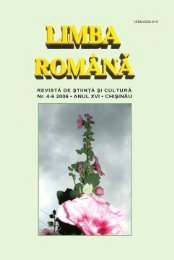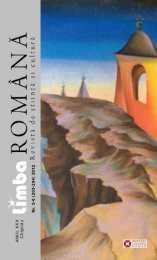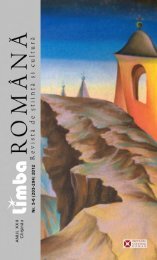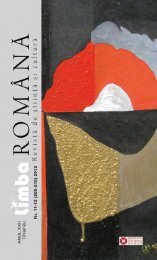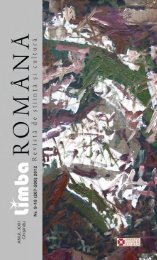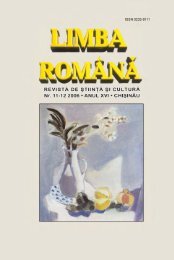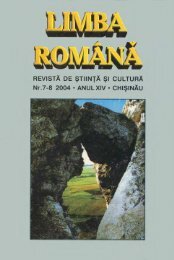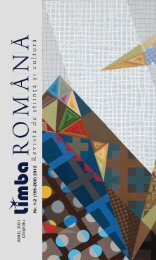Create successful ePaper yourself
Turn your PDF publications into a flip-book with our unique Google optimized e-Paper software.
Gramatică<br />
63<br />
asemănător. De remarcat şi dependenţa semnificaţiei substantivului<br />
de context: acelaşi substantiv într-o situaţie poate comporta sens activ,<br />
iar în alta pasiv. De exemplu:<br />
(1) He made an announcement. (He announced something.)<br />
(2) The general made no reply to this announcement, but took up<br />
his opera-glass (W. M. Thackeray, Vanty Fair, p. 226).<br />
În primul exemplu subiectul gramatical corespunde celui semantic,<br />
desemnând autorul acţiunii, iar în al doilea, indică rezultatul acţiunii<br />
înfăptuite de o altă persoană (având funcţie de subiect) (nu generalul<br />
„a anunţat”, dar altcineva). Substantivul announcement din propoziţia<br />
(2) are funcţia de complement direct, pe când în exemplul (1) devine<br />
parte nominală a predicatului.<br />
Printre substantivele cu semnificaţie pasivă merită să fie menţionate<br />
şi cele formate de la verbe prin intermediul adjectivelor:<br />
(3) For, as a general sends his baggage to the rear, before an<br />
action, Rebecca had wisely packed up all their chief valuables and<br />
sent them off under care of George’s servant, who went in charge of<br />
the trunks on the coach back to London (W. M. Thackeray, Vanity Fair,<br />
p. 239).<br />
În exemplul (3) remarcăm omonimia lingvistică: rădăcina de la<br />
care s-a format adjectivul valuable şi substantivul valuables coincide<br />
cu cea a verbului şi a substantivului: to value, a value. Dacă cele două<br />
cuvinte s-au format de la substantiv, ele nu pot exprima categoria de<br />
diateză. Apelând la metoda transformaţională, substituim valuables cu<br />
valuable things şi observăm, că valuable are sensul de things that can<br />
be valued, expresie în care semul de pasiv coexistă cu cel modal. Cuvântul<br />
valuables, la rândul său, preia cele două sensuri de la adjectiv,<br />
cumulând semnificaţia modală şi de diateză (pasivă), alături de cele<br />
nominale, având şi funcţia de complement direct.<br />
Precedate de pronume posesiv sau în îmbinare cu un substantiv<br />
la cazul genitiv, unele cuvintele derivate sunt active, pe când altele –<br />
pasive, denumind rezultatul unei acţiuni anterioare:<br />
(4) When he had been a certain number of years at the head<br />
of Miss Crawley’s establishment, where he had had good wages, fat<br />
perquisites, and plenty of opportunities of saving, he announced that<br />
he was about to contact a matrimonial alliance with a late cook of Miss<br />
Crawley’s (W. M. Thackeray, Vanty Fair, p. 353).<br />
(5) Indeed, when Miss Crawley quitted the world, and that money<br />
for which all her relatives had been fighting so eagerly was finally left to<br />
Pitt, Bute Crawley, who found that only five thousand pounds had been



